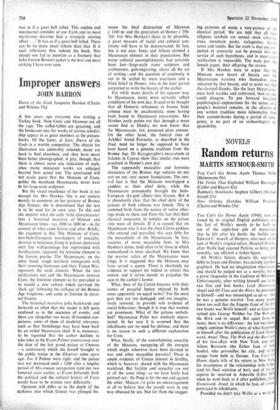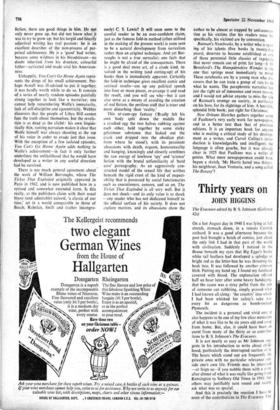NOVELS
Random returns
MARTIN SEYMOUR-SMITH
The Ticket That Exploded William Burroughs (Calder and Boyars 42s) Raman's Notebooks Stephen Gilbert (Michael Joseph 25s) New Orleans Sketches William ' Faulkner
(Chatto and Windus 25s) •
You Can't Go Home Again (1940), now re- issued by its original English publishers, was the last of Wolfe's novels to be built up out of the eight-foot pile of manuscript that he left after his death; the builder was Edward C. Aswell, of Harpers, who took on the task of Wolfe's original editor, Maxwell Perkins, after Wolfe had rejected Perkins as being, pre- sumably, too efficient a father-figure.
All Wolfe's fiction, despite his superficial debts to Joyce and Dreiser, was naively autobio- graphical. He had no imagination whatsoever, and should be judged not as a novelist but as a prose rhapsodist in the tradition of Whitman. Unfortunately, after writing himself out in his two first and best books, LOok Homeward. Angel and Of Time and the River, he pretended to himself—and was encouraged to do so—that he was a genuine novelist. Too many people knew too well that the Eugene Gant of the first two books was Wolfe himself; and so Gant was turned into George Webber for The Web and the Rock and its sequel. But apart from the name, there is no difference : the last two books simply continue Wolfe's story of what happened to himself after the publication of Look Home- ward, Angel. Thus, The Web and the Rock tells of his love-affair with New York and with Aileen Bernstein (the Esther Jack of both books), who personifies the city, and of his escape from both to Europe. You Can't Go Home Again tells of his return to New York, his resumption of the relationship with Esther (and his final rejection of her), and of the re- ception he received in Asheville (Libya Hill) when he went back to it after publishing Look Homeward, Angel, in which he had, of course, portrayed its inhabitants.
Provided we don't take Wolfe as a writer
fiction, there are good things in - him. He not only never grew up, but did not know what it was to try to grow up; but his turgid and beavili adjectival writing has real passion: he is an excellent describer of the non-process of per- petual adolescence. He is a 'good' bad writer, because some wildness in his bloodstream—no doubt inherited from his drunken, colourful father—activated and made vital his American- ness.
Unhappily, You Can't Go Home Again repre- sents the dregs of his small achievement. Per- haps Aswell was ill-advised to put it together; it was hardly worth while to do so. It consists of a series of nearly random episodes painfully strung together to look like a narrative; one cannot help remembering Wolfe's immaturity, lack of self-discipline and egocentricity. Webber discovers that the people of Libya Hill cannot face the truth about themselves, but the revela- tion is as dead as the cliché : his own linguis- tically thin, ranting narration makes it clear that Wolfe himself was always shouting at the top of his voice in order to evade just that issue. With the exception of a few isolated episodes, You Can't Go Home Again adds nothing to Wolfe's achievement—in fact it only further underlines the unlikelihood that he would have developed as a writer in any useful direction had he survived.
There is not much general agreement about the work of William Burroughs, whose The Ticket That Exploded originally appeared .in Paris in 1962, and is now published here in a revised and somewhat extended form. Is this really, as the publishers claim with their usual brave (and admirable) naiveté, 'a classic of our time,' set in a world comparable to those of Bosch, Rabelais, Swift and (rather incongru- ously) C. S. Lewis? -It will soon seem to the careful reader to be an over-confident claim, just as the famous fold-in method (often utilised in the making of the present work) is soon seen to be a natural development from surrealism rather than an original technique. And yet Bur- roughs is not a true surrealist; one feels that he might be afraid of the consequences. There is a good deal more art, of a crude kind, in- volved in the writing (and cutting-up) of his books than is immediately apparent. Certainly the fold-in technique gives excellent comic and satirical results—cut up any political speech into four or more pieces, re-arrange it and read the result, and you will see why—but it can also serve as a means of avoiding the creation of real fiction; the perilous stuff that is truer and more disturbing than 'reality.'
This sF-cum-spy fantasy (`Bradly felt his own body split down the middle like a cracked egg the two halves rubbing against each other, held together by some sticky gelatinous substance that leaked out the crack and dripped into the obsidian plat- form where he stood'), with its persistent obsessions with death, orgasm, homosexuality and hanging, knowingly and cleverly combines the raw energy of lowbrow 'spy' and 'science' fiction with the brutal unfamiliarity of 'hard core' pornography. As an aggressively con- structed model of the sexual life that writhes beneath the rigid crust of the kind of respect- ability that is possessed by social functionaries such as executioners, censors, and so on, The Ticket That Exploded is all very well. But it does not shock—and its only value is to shock —any reader who has not dedicated himself to the official surface of his society. It does not explore motives, and its obsessions show the
author to be almost as trapped by anti-conven- tion as his victims (for his readers must be. specifically, his victims) are by convention.
Batman's Notebooks, by a writer who is spar- ing of his talents (five books in twenty-five years), deserves to become established as one of those perennial little classics of ingenuity that never remain out of print for long—J. D. Beresford's The Hampdenshire Wonder is the one that springs most immediately to mind. These notebooks are by a young man who dis- covers that he can train a group of rats to do what he wants. The paraphrenic narrative has just the right air of innocence and sweet reason, and I would not advise anyone to miss the tale of Ratman's revenge on society, in particular on his boss, for its slightings of him. A horrible, splendid little book; just right for Christmas.
New Orleans Sketches gathers together some of Faulkner's very early work for newspapers, and in a better text than that of previous editions. It is an important book for anyone who is making a critical study of his develop- ment as a writer, and Carvel Collins's intro- duction is knowledgeable and intelligent; the language is often gauche, but it was already clear in 1925 that Faulkner was a writer of genius. What mere newspaperman ,could have begun a sketch, 'Mr Harris hated two things: his neighbour, Juan Venturia, and a song called The Rosary'?



































 Previous page
Previous page